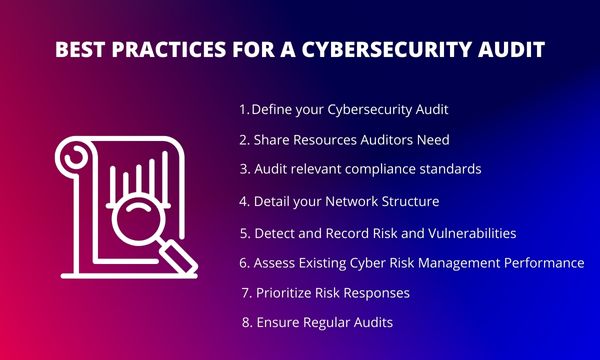
Are you thinking, if you need a cybersecurity audit for your business? Or maybe you implemented a cybersecurity audit sometime back, you don't remember. With the increasing cyber incidents globally no business is safe online.
According to Gartner's report, 41% of employees that went remote due to the pandemic want to continue to work from home. These kinds of changes in the global workforce also increase the challenges in implementing security policies. Regular security audits are mandatory to keep a check on the risk environment and preparation against cyberattacks.
What is Cybersecurity Audit?
A cybersecurity audit is a thorough analysis and review of the level of protection of the IT infrastructure in your organisation. It is conducted to detect vulnerabilities, threats, loopholes and configuration defects. This also helps the organisation in preparing for compliances.
Cybersecurity audits help in taking a proactive approach while designing IT policies with better threat management. These audits are conducted by third-party vendors to eliminate the biases. The internal team can also administer the audit as long as they act independently of the organisation. The audit includes all control sets, management practices, and governance risk and compliance (GRC) provisions in force at the enterprise level. As per the business requirements, the external audits may include third parties bound by a contract containing audit rights (suggested by ISACA).
Read more: Cyber security audit Checklist
Why do you need a cybersecurity audit?
You may be mistaken, If you think you can apply cybersecurity once and for all. Tracking the changes that happen with every small change in the network due to addition or deletion in the IT infrastructure is not an easy task.
Cybersecurity is not only technical resilience but it is information and data security. Threat actors target processes, people, procedures and any possible weakest link. These may be lacking password policy or limited access.
Regular Cybersecurity Audits will help in rectifying security issues. It will help in securing the cyber security of the organisations by having a proper security process and procedure in place. Finding all the possible loopholes with the solutions to help in securing the business is the prime objective of cybersecurity.
Scope of cybersecurity audits
Ensuring 360-degree in-depth audits for the organisation's security postures is the aim of cybersecurity audits. It detects vulnerabilities, threats, configuration loops and risks that the organisation face. This includes the areas like -
-
Physical Security - Reviews the policies for data storage, role-based access controls, biometric access, multi-factor authentication etc.
-
System Security - Reviews the process for hardening, patching, privileged account management, role-based access etc.
-
Network Security - This includes a review of network and security controls, SOC, security monitoring, anti-virus configurations, malware detection etc.
-
Operational Security - Security policies, procedures and controls come under this review.
-
Data Security - Data encryption, data security at rest and in transition and network access controls are being reviewed under this.
Cybersecurity audits can cover other areas like Cyber risk governance, legal, regulatory and contractual requirements, business continuity, incident management, training and awareness and third-party management.
Benefits of cybersecurity audits
Often organisations may assume that their cybersecurity solutions are maintained and managed by standard risk assessment. Cybersecurity audits are far beyond that, it covers the security risk assessment unique to the organisation. Some of the major reasons why regular cybersecurity auditing has become inevitable are -
Identifies security risks- A cybersecurity audit helps in finding the weaknesses of the entire IT infrastructure. After identifying the flaws the organisation can take measures to fill those gaps.
Testing controls and processes - The cybersecurity audit helps in testing the controls and processes of the system. Finding the faults
Better security posture - With regular audits, the new security policy can be framed along the lines to accommodate the findings of the audit. This will make a better security policy.
Compliance ready - The majority of the compliances want the organisations to follow the security policies for the security of the data, process and structure to ensure the standards. A small security breach will have a big impact on society and the economy.
Human dimensions - As per the requirement, the organisations can audit the human factor as well. This will include how employees collect, share and store sensitive information.
Saves from the losses - The security breach will not only lead to the financial loss but the loss of trust in the business. At times may disrupt the organisation completely.
Internal vs External audits
Cybersecurity Audits are majorly classified into Internal Audits and External Audits.
External Audits - These audits are performed by experienced professionals with the appropriate software and tools. These auditors are well versed with all the security protocols and are trained in detecting flaws in cybersecurity risk management.
Internal Audits - These audits may be performed by the internal teams having the expertise to detect the flaws in the system. But these audits may get biased on certain preferences.
External audits can be expensive for the smaller organisations and hence finding the auditor and setting the expectations correctly is very important. On the other hand, internal audits can be used to understand and access potential risks. For the best practices, it is advised to conduct external audits at regular intervals.
Final Thoughts
For solving any problem it is important to define it. Studying all the possible solutions and then selecting the best-suited one to apply. Similarly, in the case of organisations' cybersecurity, It is mandatory to thoroughly analyse and find all possible loopholes. The cybersecurity audit will help in finding these loops that need to be fixed to strengthen the organisation's security along with the possible solutions.
Finding the cyber security issues is like winning a half war. It becomes easy to proactively address the issues before they get into the sights of threat actors. With the help of regular cyber security evaluations and subsequent reports, the IT leaders can accurately access the business risk and get them fixed on time.
Illume Intelligence India Pvt. Ltd. is a leading Cyber security Solutions company and expertise in cyber security audits. To know more on how to secure your Organisation contact us today!



